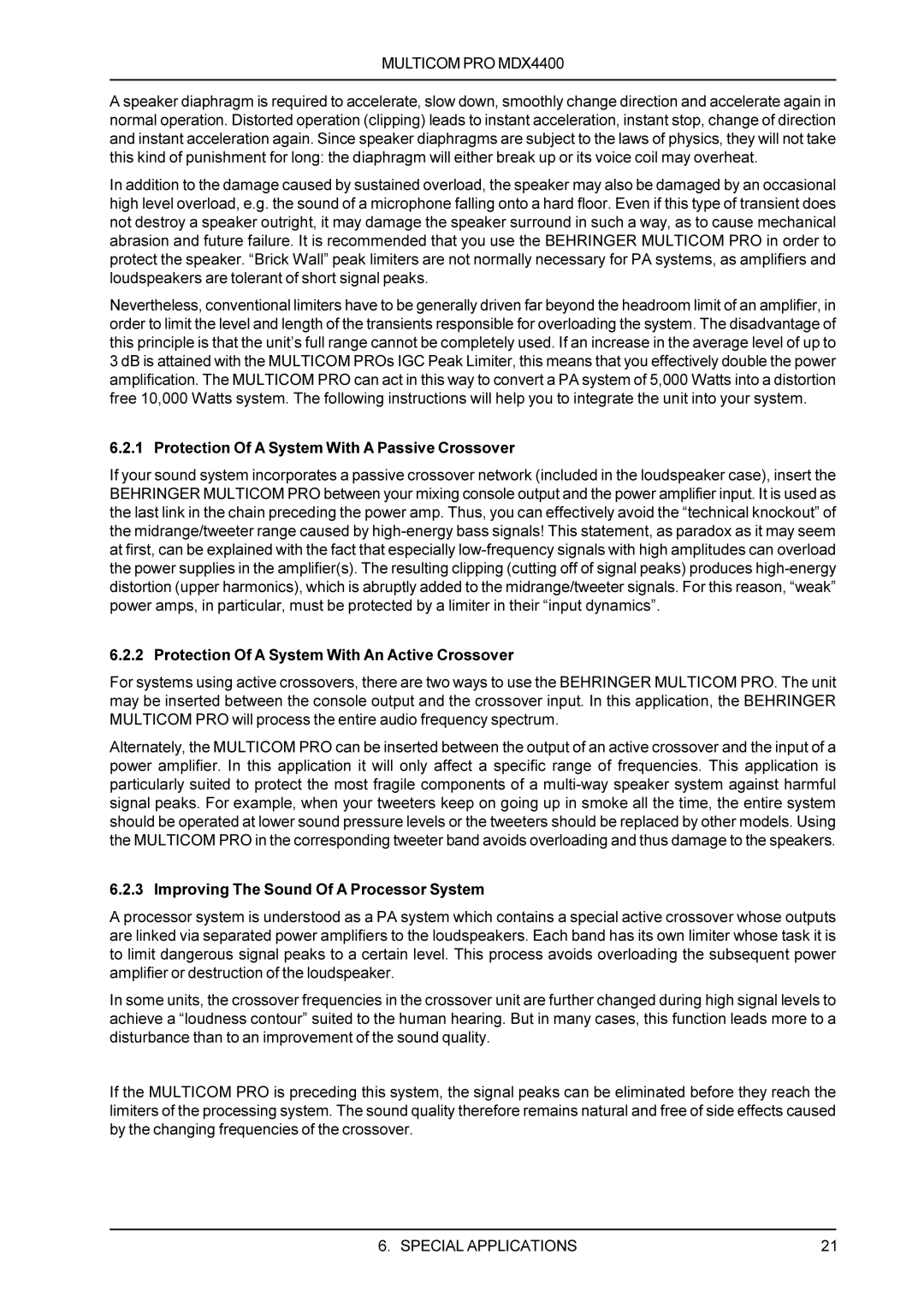
MULTICOM PRO MDX4400
A speaker diaphragm is required to accelerate, slow down, smoothly change direction and accelerate again in normal operation. Distorted operation (clipping) leads to instant acceleration, instant stop, change of direction and instant acceleration again. Since speaker diaphragms are subject to the laws of physics, they will not take this kind of punishment for long: the diaphragm will either break up or its voice coil may overheat.
In addition to the damage caused by sustained overload, the speaker may also be damaged by an occasional high level overload, e.g. the sound of a microphone falling onto a hard floor. Even if this type of transient does not destroy a speaker outright, it may damage the speaker surround in such a way, as to cause mechanical abrasion and future failure. It is recommended that you use the BEHRINGER MULTICOM PRO in order to protect the speaker. “Brick Wall” peak limiters are not normally necessary for PA systems, as amplifiers and loudspeakers are tolerant of short signal peaks.
Nevertheless, conventional limiters have to be generally driven far beyond the headroom limit of an amplifier, in order to limit the level and length of the transients responsible for overloading the system. The disadvantage of this principle is that the unit’s full range cannot be completely used. If an increase in the average level of up to 3 dB is attained with the MULTICOM PROs IGC Peak Limiter, this means that you effectively double the power amplification. The MULTICOM PRO can act in this way to convert a PA system of 5,000 Watts into a distortion free 10,000 Watts system. The following instructions will help you to integrate the unit into your system.
6.2.1 Protection Of A System With A Passive Crossover
If your sound system incorporates a passive crossover network (included in the loudspeaker case), insert the BEHRINGER MULTICOM PRO between your mixing console output and the power amplifier input. It is used as the last link in the chain preceding the power amp. Thus, you can effectively avoid the “technical knockout” of the midrange/tweeter range caused by
6.2.2 Protection Of A System With An Active Crossover
For systems using active crossovers, there are two ways to use the BEHRINGER MULTICOM PRO. The unit may be inserted between the console output and the crossover input. In this application, the BEHRINGER MULTICOM PRO will process the entire audio frequency spectrum.
Alternately, the MULTICOM PRO can be inserted between the output of an active crossover and the input of a power amplifier. In this application it will only affect a specific range of frequencies. This application is particularly suited to protect the most fragile components of a
6.2.3 Improving The Sound Of A Processor System
A processor system is understood as a PA system which contains a special active crossover whose outputs are linked via separated power amplifiers to the loudspeakers. Each band has its own limiter whose task it is to limit dangerous signal peaks to a certain level. This process avoids overloading the subsequent power amplifier or destruction of the loudspeaker.
In some units, the crossover frequencies in the crossover unit are further changed during high signal levels to achieve a “loudness contour” suited to the human hearing. But in many cases, this function leads more to a disturbance than to an improvement of the sound quality.
If the MULTICOM PRO is preceding this system, the signal peaks can be eliminated before they reach the limiters of the processing system. The sound quality therefore remains natural and free of side effects caused by the changing frequencies of the crossover.
6. SPECIAL APPLICATIONS | 21 |
